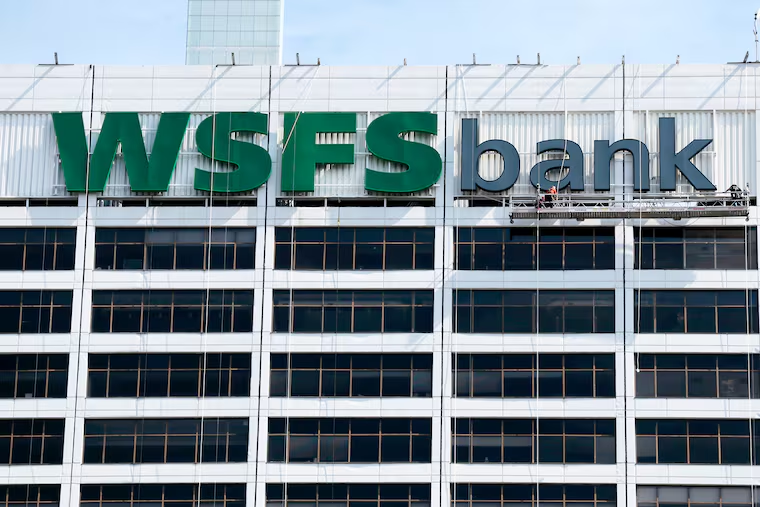WSFS buys Bryn Mawr Trust for $1 billion, bulks up as Philly area’s largest bank
WSFS is bulking up and presenting itself as Philly's hometown bank

WSFS Financial Corp., the largest bank still based in the Philadelphia area, says it will pay $976.4 million to acquire Bryn Mawr Bank Corp., boosting its presence in the city’s wealthy suburbs and strengthening its claim as Philly’s hometown competitor against the big national banks that dominate the business.
The sale price works out to $48.55 a share, to be paid Bryn Mawr shareowners. That’s up about $6 from its trading value in recent days, nearly double its low from last year’s recession, and almost even with Bryn Mawr shares’ all-time high in 2017. The company’s main business is Bryn Mawr Trust.
The deal makes WSFS “uniquely positioned as the only locally headquartered bank with the size and scale to compete with the big guys,” said WSFS chief executive Rodger Levenson, a Broomall native, in an interview.
With nearly $20 billion in loans and other assets, and more than $40 billion in client investments, the banks will also control nearly 7% of bank deposits in the Philadelphia region, the fourth-largest banking market in the United States, according to FDIC data.
Locally, the combined bank will still trail the local operations of five national lenders — Wells Fargo, TD, Citizens, PNC and Bank of America — which between them have bought up all of Philadelphia’s historic major banks and cut more than 20,000 Center City jobs since the 1980s.
WSFS employs 1,900, Bryn Mawr about 600. The buyer plans to close about one-third of the companies’ combined 140 bank branches, including competing locations that will now be part of the same owner.
Levenson said he expects to cut about 250 “overlapping” jobs as part of the takeover, at an upfront cost of $127 million in severance and other expenses, for annual savings of $73 million a year.
But the CEO added that WSFS already has 150 open or expected new positions this year that displaced workers should be able to apply for, and he hopes to keep layoffs to a minimum. He plans to keep WSFS’ office centers in Wilmington and on Market Street in Philadelphia, as well as Bryn Mawr Trust’s offices on Lancaster Avenue in the Bryn Mawr retail district close to its Septa station.
“Personally, it’s a sad day,” said Ted Peters, who was Bryn Mawr’s chairman and CEO from 2000-14. He said his predecessors had diversified the bank in an attempt to compete with larger lenders, but had a tough time making it as profitable as investors expected, and were finally obliged to sell.
“WSFS is a good bank and Roger is a very good guy, but I’m going to be sad when I go past there next year and the Bryn Mawr signs are all replaced,” Peters added.
Buying Bryn Mawr, two years after WSFS acquired Beneficial Bank, then the largest based in Philadelphia, helps WSFS speed up its goal of building an independent regional lending and investment-management company. The bank can promote offering personal attention to small-business borrowers and people turned off by increasingly automated services at the big national investment houses, Levenson added.
The sale “is a sound decision for Bryn Mawr, our stockholders, our clients and the communities we serve,” Bryn Mawr boss Frank Leto said in a statement. He will retire as part of the deal, while joining the WSFS board with two other as-yet-unnamed directors. They will serve alongside WSFS directors including Wawa chief executive Chris Gheysens, Longwood Foundation head Eleuthere I. du Pont, and Comcast executive Karen Dougherty Buchholz, among others.
Bryn Mawr is WSFS’ 10th acquisition since 2010. Best known as a Main Line bank and money manager — its chief investment officer, Jeffrey D. Mills, a graduate of Penn, MIT and Oxford, opines often on cable TV stock market programs — Bryn Mawr added offices in neighboring counties and in Philadelphia with its own acquisitions in recent years.
“WSFS is obviously trying to buy market share, from Northeast Philly to the Main Line,” said Robert Costello, an investment manager in Feasterville. “It raises a lot of eyebrows. Bryn Mawr is selling to a company that is complementary, not supplementary, to what they mostly do.”
He predicted that other wealth-management firms will try to poach Bryn Mawr customers, obliging WSFS to act fast to reassure them it will improve services.
“Investors may be surprised” that WSFS is buying another bank so soon, but Bryn Mawr gives WSFS a “unique” opportunity to add a profitable company with lots of wealthy customers, analyst Frank Schiraldi wrote in a report to clients of Piper Sandler & Co., a New York investment bank and brokerage.
WSFS plans to keep its main offices in a Wilmington tower, a block from I-95, leaving Philadelphia as one of the largest cities without a major-bank headquarters.
WSFS plus Bryn Mawr will also be at least three times larger than the largest surviving area community banks, such as Montgomery County-based Univest and Firstrust. The banks have similar-sized client investment units, which Levenson says is an especially effective competitor for investors with “$1 million to $7 million.”
WSFS also promised it will donate $2 million to its own community foundation “to support underserved communities” as part of the deal. Acquiring banks often make such contributions to compensate for the loss of charity contributions by the companies they buy.
WSFS has 89 branches and 23 other offices across the U.S., mostly in Pennsylvania, Delaware and South Jersey. It owns a string of non-banking financial businesses, including Cash Connect, Cypress Capital Management, and Christiana Trust Co., among others. Bryn Mawr has 41 branches and nine other offices in the Philadelphia, Wilmington and Harrisburg areas.